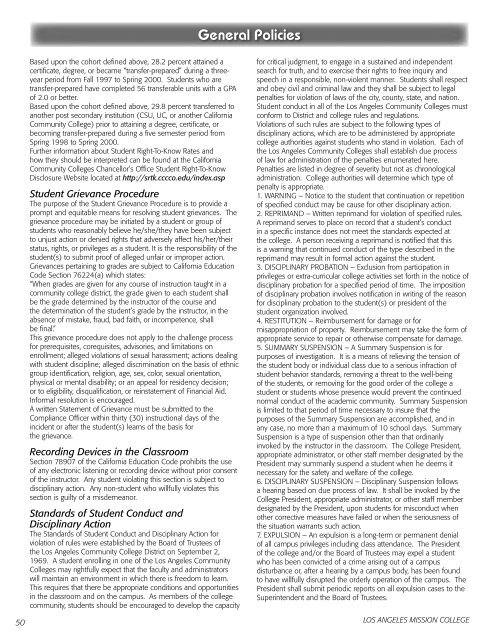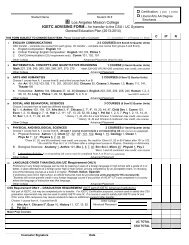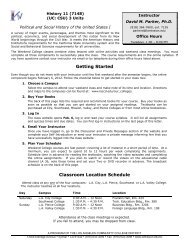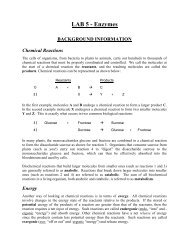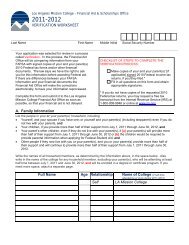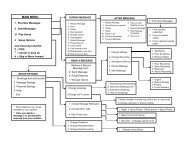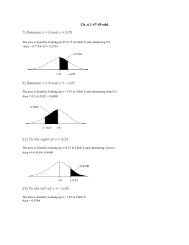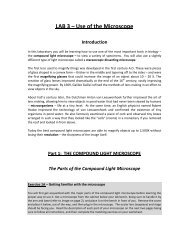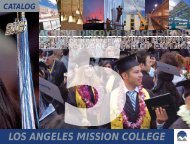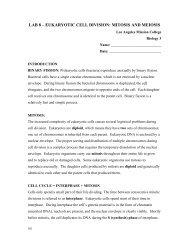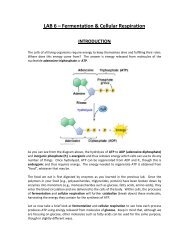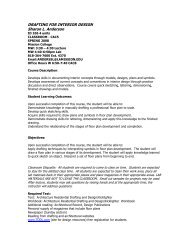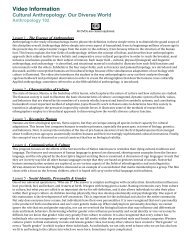Fall 2012 Schedule of Classes - Los Angeles Mission College
Fall 2012 Schedule of Classes - Los Angeles Mission College
Fall 2012 Schedule of Classes - Los Angeles Mission College
You also want an ePaper? Increase the reach of your titles
YUMPU automatically turns print PDFs into web optimized ePapers that Google loves.
General Policies<br />
50<br />
Based upon the cohort defi ned above, 28.2 percent attained a<br />
certifi cate, degree, or became “transfer-prepared” during a threeyear<br />
period from <strong>Fall</strong> 1997 to Spring 2000. Students who are<br />
transfer-prepared have completed 56 transferable units with a GPA<br />
<strong>of</strong> 2.0 or better.<br />
Based upon the cohort defi ned above, 29.8 percent transferred to<br />
another post secondary institution (CSU, UC, or another California<br />
Community <strong>College</strong>) prior to attaining a degree, certifi cate, or<br />
becoming transfer-prepared during a fi ve semester period from<br />
Spring 1998 to Spring 2000.<br />
Further information about Student Right-To-Know Rates and<br />
how they should be interpreted can be found at the California<br />
Community <strong>College</strong>s Chancellor’s Offi ce Student Right-To-Know<br />
Disclosure Website located at http://srtk.cccco.edu/index.asp<br />
Student Grievance Procedure<br />
The purpose <strong>of</strong> the Student Grievance Procedure is to provide a<br />
prompt and equitable means for resolving student grievances. The<br />
grievance procedure may be initiated by a student or group <strong>of</strong><br />
students who reasonably believe he/she/they have been subject<br />
to unjust action or denied rights that adversely affect his/her/their<br />
status, rights, or privileges as a student. It is the responsibility <strong>of</strong> the<br />
student(s) to submit pro<strong>of</strong> <strong>of</strong> alleged unfair or improper action.<br />
Grievances pertaining to grades are subject to California Education<br />
Code Section 76224(a) which states:<br />
“When grades are given for any course <strong>of</strong> instruction taught in a<br />
community college district, the grade given to each student shall<br />
be the grade determined by the instructor <strong>of</strong> the course and<br />
the determination <strong>of</strong> the student’s grade by the instructor, in the<br />
absence <strong>of</strong> mistake, fraud, bad faith, or incompetence, shall<br />
be fi nal.”<br />
This grievance procedure does not apply to the challenge process<br />
for prerequisites, corequisites, advisories, and limitations on<br />
enrollment; alleged violations <strong>of</strong> sexual harassment; actions dealing<br />
with student discipline; alleged discrimination on the basis <strong>of</strong> ethnic<br />
group identifi cation, religion, age, sex, color, sexual orientation,<br />
physical or mental disability; or an appeal for residency decision;<br />
or to eligibility, disqualifi cation, or reinstatement <strong>of</strong> Financial Aid.<br />
Informal resolution is encouraged.<br />
A written Statement <strong>of</strong> Grievance must be submitted to the<br />
Compliance Offi cer within thirty (30) instructional days <strong>of</strong> the<br />
incident or after the student(s) learns <strong>of</strong> the basis for<br />
the grievance.<br />
Recording Devices in the Classroom<br />
Section 78907 <strong>of</strong> the California Education Code prohibits the use<br />
<strong>of</strong> any electronic listening or recording device without prior consent<br />
<strong>of</strong> the instructor. Any student violating this section is subject to<br />
disciplinary action. Any non-student who willfully violates this<br />
section is guilty <strong>of</strong> a misdemeanor.<br />
Standards <strong>of</strong> Student Conduct and<br />
Disciplinary Action<br />
The Standards <strong>of</strong> Student Conduct and Disciplinary Action for<br />
violation <strong>of</strong> rules were established by the Board <strong>of</strong> Trustees <strong>of</strong><br />
the <strong>Los</strong> <strong>Angeles</strong> Community <strong>College</strong> District on September 2,<br />
1969. A student enrolling in one <strong>of</strong> the <strong>Los</strong> <strong>Angeles</strong> Community<br />
<strong>College</strong>s may rightfully expect that the faculty and administrators<br />
will maintain an environment in which there is freedom to learn.<br />
This requires that there be appropriate conditions and opportunities<br />
in the classroom and on the campus. As members <strong>of</strong> the college<br />
community, students should be encouraged to develop the capacity<br />
for critical judgment, to engage in a sustained and independent<br />
search for truth, and to exercise their rights to free inquiry and<br />
speech in a responsible, non-violent manner. Students shall respect<br />
and obey civil and criminal law and they shall be subject to legal<br />
penalties for violation <strong>of</strong> laws <strong>of</strong> the city, county, state, and nation.<br />
Student conduct in all <strong>of</strong> the <strong>Los</strong> <strong>Angeles</strong> Community <strong>College</strong>s must<br />
conform to District and college rules and regulations.<br />
Violations <strong>of</strong> such rules are subject to the following types <strong>of</strong><br />
disciplinary actions, which are to be administered by appropriate<br />
college authorities against students who stand in violation. Each <strong>of</strong><br />
the <strong>Los</strong> <strong>Angeles</strong> Community <strong>College</strong>s shall establish due process<br />
<strong>of</strong> law for administration <strong>of</strong> the penalties enumerated here.<br />
Penalties are listed in degree <strong>of</strong> severity but not as chronological<br />
administration. <strong>College</strong> authorities will determine which type <strong>of</strong><br />
penalty is appropriate.<br />
1. WARNING – Notice to the student that continuation or repetition<br />
<strong>of</strong> specifi ed conduct may be cause for other disciplinary action.<br />
2. REPRIMAND – Written reprimand for violation <strong>of</strong> specifi ed rules.<br />
A reprimand serves to place on record that a student’s conduct<br />
in a specifi c instance does not meet the standards expected at<br />
the college. A person receiving a reprimand is notifi ed that this<br />
is a warning that continued conduct <strong>of</strong> the type described in the<br />
reprimand may result in formal action against the student.<br />
3. DISCIPLINARY PROBATION – Exclusion from participation in<br />
privileges or extra-curricular college activities set forth in the notice <strong>of</strong><br />
disciplinary probation for a specifi ed period <strong>of</strong> time. The imposition<br />
<strong>of</strong> disciplinary probation involves notifi cation in writing <strong>of</strong> the reason<br />
for disciplinary probation to the student(s) or president <strong>of</strong> the<br />
student organization involved.<br />
4. RESTITUTION – Reimbursement for damage or for<br />
misappropriation <strong>of</strong> property. Reimbursement may take the form <strong>of</strong><br />
appropriate service to repair or otherwise compensate for damage.<br />
5. SUMMARY SUSPENSION – A Summary Suspension is for<br />
purposes <strong>of</strong> investigation. It is a means <strong>of</strong> relieving the tension <strong>of</strong><br />
the student body or individual class due to a serious infraction <strong>of</strong><br />
student behavior standards, removing a threat to the well-being<br />
<strong>of</strong> the students, or removing for the good order <strong>of</strong> the college a<br />
student or students whose presence would prevent the continued<br />
normal conduct <strong>of</strong> the academic community. Summary Suspension<br />
is limited to that period <strong>of</strong> time necessary to insure that the<br />
purposes <strong>of</strong> the Summary Suspension are accomplished, and in<br />
any case, no more than a maximum <strong>of</strong> 10 school days. Summary<br />
Suspension is a type <strong>of</strong> suspension other than that ordinarily<br />
invoked by the instructor in the classroom. The <strong>College</strong> President,<br />
appropriate administrator, or other staff member designated by the<br />
President may summarily suspend a student when he deems it<br />
necessary for the safety and welfare <strong>of</strong> the college.<br />
6. DISCIPLINARY SUSPENSION – Disciplinary Suspension follows<br />
a hearing based on due process <strong>of</strong> law. It shall be invoked by the<br />
<strong>College</strong> President, appropriate administrator, or other staff member<br />
designated by the President, upon students for misconduct when<br />
other corrective measures have failed or when the seriousness <strong>of</strong><br />
the situation warrants such action.<br />
7. EXPULSION – An expulsion is a long-term or permanent denial<br />
<strong>of</strong> all campus privileges including class attendance. The President<br />
<strong>of</strong> the college and/or the Board <strong>of</strong> Trustees may expel a student<br />
who has been convicted <strong>of</strong> a crime arising out <strong>of</strong> a campus<br />
disturbance or, after a hearing by a campus body, has been found<br />
to have willfully disrupted the orderly operation <strong>of</strong> the campus. The<br />
President shall submit periodic reports on all expulsion cases to the<br />
Superintendent and the Board <strong>of</strong> Trustees.<br />
LOS ANGELES MISSION COLLEGE


